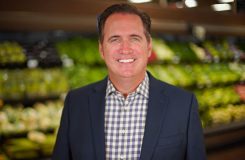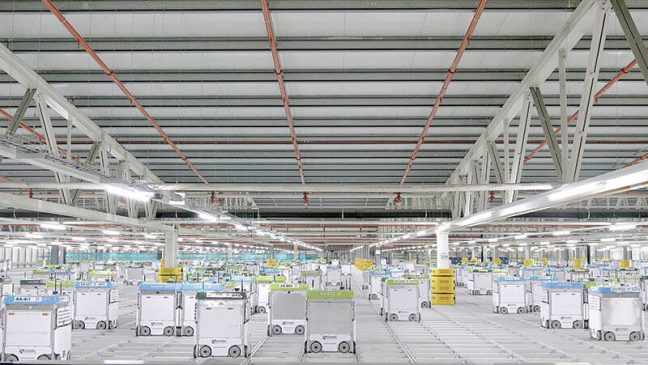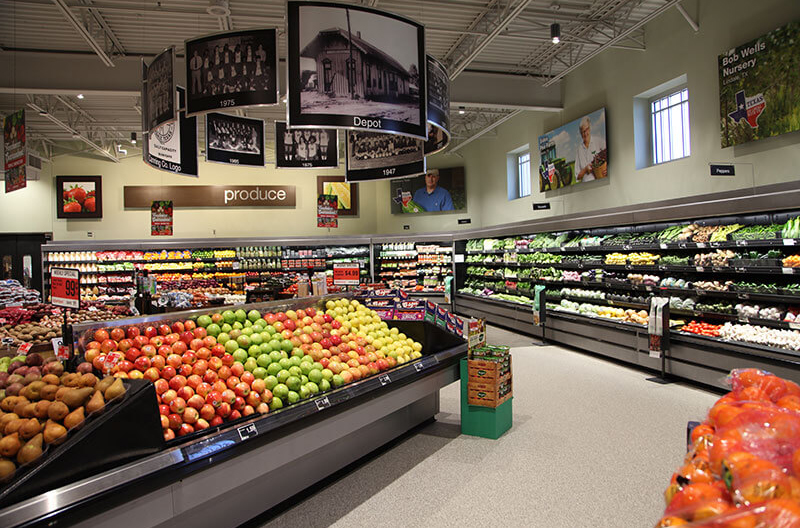by John McCurry/contributing writer
In-migration to North Texas helps keep grocers happy and optimistic. Major corporate relocations to the region have brought an influx of new customers.
Texas ranked second in the nation for relocation activity in 2018, according to the 2020 edition of the Texas Relocation Report released earlier this year by the Texas Realtors organization, which analyzes the latest migration data from the U.S. Census Bureau and U-Haul.
“For the sixth year in a row, more than half a million people chose Texas as their new home,” said Cindi Bulla, 2020 chairman of Texas Realtors. “And why not? In addition to its business-friendly environment with no state income tax and abundance of jobs, land and opportunity, Texas is known for its diverse, friendly spirit and culture.”
According to the report, Texas welcomed 563,945 new residents in 2018. This figure is more than the number of out-of-state residents who moved to Texas in 2017 (524,511). The net gain of out-of-state residents in Texas in 2018 increased 78.1 percent from 57,173 in 2017 to 101,805 residents in 2018.
And the expansions keep on coming. Gulfstream Aerospace announced on Feb. 20 that it would build a service center at Fort Worth Alliance Airport, creating 50 jobs.
All of these expansions and relocations boost traffic in area grocery stores, said Gary Huddleston, grocery industry consultant for the Texas Retailers Association. Chief among them is Toyota opening its U.S. headquarters in Plano in 2017. That move subsequently attracted ancillary businesses.
“The economy in North Texas is extremely strong with all the new families that have moved in,” Huddleston said.
However, the pace of new grocery store openings in the region has slowed. Huddleston attributes that in part to online grocery sales. Nearly everyone in the industry is participating in the trend.
“If they are not at least offering pickup at stores, they are not keeping up with the competition,” he said.
Huddleston said as more people move into the urban areas of North Texas, such as Dallas and Fort Worth, the trend is toward store construction from the ground up with office and residential on the upper floors to help with costs. Parking is always challenging, he said.
“North Texas is similar to Atlanta in that it is very strong for retail,” he said.
Grocer activity in the region
Tyler, Texas-based Brookshire Grocery Co. has been busy renovating stores over the several months. In fact, the company has issued announcements about at least a dozen renovations since last July. The most recent was in El Dorado.
The updated supermarket boasts a modern look with new exterior and interior paint, décor and signage. The store design is complemented by new flooring, check stands, energy efficient LED lighting and refrigerated cases, along with new shopping carts for customers.
“We are very proud to have been part of the El Dorado community for more than 40 years and to celebrate this beautifully renovated store,” said Brad Brookshire, chairman and CEO of Brookshire Grocery Co. “Our company’s mission is to create and deliver exceptional experiences and value to our customers, and we invite everyone to come in and see all that’s new at Brookshire’s.”
Brookshire’s also has remodeled stores in Paris, Texas, Gladewater, Eastland, Whitney, Atlanta, Mineola, Overton, Cisco, Bowie, Albany and Arcadia.

Tom Schwilke, president of Kroger’s Dallas division, told The Shelby Report that grocery retail continues to evolve, as customers are busier than ever before. He said this hectic pace has led to the integration of technology and expansion of convenient services like digital coupons, curbside pickup and home delivery.
“Kroger’s obsession on customer experience and focus on operational excellence has only increased,” Schwilke said. “Kroger has many stores in the Dallas-Fort Worth area—one of the fastest-growing and competitive retail metropolitan areas in America—and we are at the forefront of this cutting-edge technology.
Schwilke said Kroger’s with recent announcement of its Ocado fulfillment center in Dallas, these “transformative” shopping options will create local jobs, enable seamless customer experiences and accelerate Kroger’s ability to expand its products and services to a larger footprint in North Texas.

“I have served customers in the grocery business for more than 35 years in multiple markets, and as the retail environment continues changing rapidly, our customers’ expectations and associates’ needs continue to transform as well,” he said. “I am confident Restock Kroger, our plan to redefine the customer experience, will deliver on our vision to serve America through food inspiration and uplift. These efforts continue to drive strategic framework that will help us thrive as America’s grocer.
“Kroger will always seek to accelerate our progress and challenge ourselves to ensure everyone has access to fresh, affordable and delicious food, no matter who you are, how you shop or what you like to eat,” Schwilke continued. “Kroger’s winning combination of assets puts our team in a unique position to deliver fresh for everyone.”
Kroger announced its Ocado customer fulfillment center in Dallas last September. It will measure 350,000 s.f. and is expected to create up to 400 new jobs. Kroger is partnering with Ocado, a British online supermarket, that describes itself as “the world’s largest online grocery retailer” in development of up to 20 of these facilities which are automated with digital and robotic capabilities.

